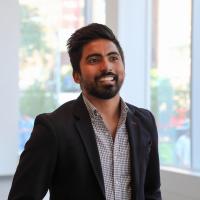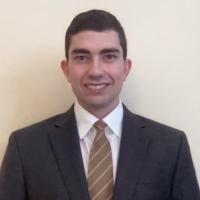Garcia Lab

Principal Investigator
Dr. Garcia's research has focused on neurophysiology (including human/rodent EEG and patch-clamp electrophysiology) and behavioral testing in animal models. His translational laboratory research focuses on models of neuronal degeneration caused by age, anesthesia, or other pharmacologic exposure. He has transitioned some of this research into the human/clinical realm. His clinical research projects involve investigating intraoperative EEG signatures and their association with adverse postoperative outcomes. Early recognition of cognitive problems can aid in preventing an escalation of clinical acuity and bring down hospital costs. Specific sequences observed in frontal EEG during emergence from general anesthesia are associated with pain and delirium in the recovery room. Understanding the generation of these signals can lead to improved care for patients in the care of anesthesiologists.
Lab Members
Paul Garcia
- Associate Professor and Chief of the Division of Neuroanesthesia
Dr. Garcia's translational laboratory research focuses on models of neuronal degeneration caused by age, anesthesia, or other pharmacologic exposure. He has transitioned some of this research into the human/clinical realm. His clinical research projects involve investigating intraoperative EEG signatures and their association with adverse postoperative outcomes.

Seyed Mohammad Taghi Mansouri
- Associate Research Scientist
Dr. Mansouri received his PharmD degree from Ahvaz Jundishapur University of Medical Sciences, Iran, in 2003 and a Ph.D. in pharmacology from Mashhad University of Medical Sciences, Iran, in 2008. From 2008 to 2017 he served as Assistant Professor at Jundishapur Medical School and participated in teaching pharmacology to medical students. As PI or co-Investigator on Ahvaz Jundishapur Medical School projects, he focused on the pharmacology of pain and inflammation, drug addiction, brain injury, and cognition. His research led to more than 60 peer-reviewed publications. He also successfully directed three Ph.D. student theses at his former laboratory. In 2018, as an Associate Research Scientist, he joined Dr. Garcia’s lab and started working on a project to examine the impact and the mechanism(s) by which brain stimulation affect anesthesia-induced perioperative neurocognitive disorders in rodent models of cognitive dysfunction. He uses a combination of techniques including brain stimulation, EEG recording, pharmacology, biochemistry, and behavioral analysis to address these questions. He is hoping that his translational research opens a new window to find novel strategies that promote favorable cognitive recovery trajectories after surgical anesthesia, especially in vulnerable patients.

Tuan Cassim
- Clinical Research Coordinator
Tuan Cassim received his bachelor’s degree in psychology from City College of the City University of New York in 2017. He pursued his graduate education at the Vrije University of Amsterdam, the Netherlands, in cognitive neuropsychology. Tuan’s research and clinical interests lie in neuropsychology, neurodegenerative diseases, and cognitive testing using methods such as EEG, tDCS, and neuropsychological evaluations. During his graduate studies, he was trained in neuropsychology research and studied the effects of physical activity and cognitive phenotype in APOE-4 allele carriers. Tuan also has experience working in a lab focused on the psychophysiology of autism and the broader autism phenotype at the College of Staten Island of the City University of New York. Tuan studied autistic traits as they relate to cardiac autonomic activity, interoceptive accuracy, and emotion processing. In his current role as a clinical research coordinator for the Neuroanesthesia Division at Columbia University Irving Medical Center, Tuan participates in Dr. Paul Garcia’s clinical research studies focusing on the neurophysiology of the sedated brain investigating intraoperative EEG signatures, and their association with adverse postoperative outcomes such as delirium. Tuan is on his way to pursuing a Ph.D. in clinical neuropsychology at the University of Utah and will remain an active collaborator with the Garcia lab.

Vikas Chauhan
- Assistant Professor, Neuroanesthesia
Dr. Chauhan completed his medical school training in India. Thereafter he went on to pursue his residency in anesthesiology as well as his fellowship in neuroanesthesiology from All India Institute of Medical Sciences, New Delhi, India. After moving to the US, he completed a postdoctoral clinical fellowship in neuroanesthesiology from Columbia University Irving Medical Center in 2022. In his current role as assistant professor of neuroanesthesia at Columbia, his research interest involves improving the clinical outcome of complex neurosurgical cases with the use of EEG monitoring. He works with Dr. Garcia in the clinical research of intraoperative EEG.

Meah Ahmed
- Clinical Research Coordinator
Meah Ahmed received his bachelor’s degree in biomedical engineering from the University of Rochester in 2022, where he also studied computer science. His expertise lies in the general neuroscience of clinical and animal models, biomedical signals, biomedical systems, and circuits. He also is adept at software engineering and programming, specifically in working with big data, database systems, data mining, and machine learning models associated with precision-medicine-driven computational algorithms. Meah’s future research interests lie in the discovery and use of engineering or clinical interventions to improve the treatment of neurological/neurodegenerative disorders, and deeper academic understanding of clinical outcomes or precursors related to disturbances of human consciousness. In his current role as a clinical research coordinator for the Neuroanesthesia Division at Columbia University Irving Medical Center, Meah participates in Dr. Paul Garcia’s clinical research studies focusing on the neurophysiology of the sedated brain investigating intraoperative EEG signatures, and their association with adverse postoperative outcomes such as delirium. Many of these studies also involve assessing neuropsychological outcomes for patients who are at risk for delirium following surgery at the PACU. He is also involved in animal studies, in collaboration with Dr. Mansouri, which involves rat models that are pharmacologically manipulated to better understand EEG signatures of anesthesia for different groups (i.e., various neurosynaptic receptor knockouts, Alzheimer’s, wild types, etc.) After his time at Columbia, Meah hopes to pursue his MD/Ph.D. or MD-MS.eng at the Sidney Kimmel Medical College in Philadelphia’s Thomas Jefferson University.

Morgan Graves
- Resident
Dr. Graves is a current anesthesiology resident at Columbia University Irving Medical Center. He completed medical school at Georgetown University School of Medicine. Following residency, Morgan will complete his neuro-anesthesiology and T32 postdoctoral fellowships. His research interests are focused on intraoperative EEG signatures to improve anesthetic care and neuronal signaling responsible for anesthesia and emergence.

Alice Daramola
- Research Assistant--Medical Student
Alice Daramola is a fourth-year medical student at the Columbia Vagelos College of Physicians and Surgeons and is originally from Tallahassee, FL. She received her BS in Neuroscience from the University of Miami, where she was involved in both basic science and translational research on traumatic brain injuries. Following her undergraduate studies, she pursued her MPH with a concentration in behavioral sciences and health education at the Emory Rollins School of Public Health. Her graduate thesis explored the experiences of youth football coaches with an intervention aimed at reducing head injuries in the sport. Her current research interests include postoperative delirium, and during her time in Dr. Garcia’s lab, she has been studying incidence and risk factors for post-anesthesia care unit delirium at Columbia University Irving Medical Center. Alice will be applying to anesthesiology residency programs this upcoming residency cycle.

Oliver Isik
- Research Assistant--Medical Student
Oliver Isik is a medical student and aspiring anesthesiologist at the Columbia Vagelos College of Physicians & Surgeons. He hails from Seattle, WA. He received his ScB and ScM in Physics from Brown University, where he conducted nanopore biophysics research. Specific projects included studying the translocations of spherical viruses through solid-state nanopores and designing a nanopore mass spectrometer as a technique for single-biomolecule protein sequencing. His current research interests involve applying the science and techniques learned while studying physics to clinical care in and out of the operating room. His work with Dr. Garcia centers on the use of transcranial direct current stimulation and auditory stimulation to modulate the intraoperative EEG, in an effort to better understand and possibly treat the mechanisms of postoperative delirium. Oliver will be applying for anesthesiology residency in the fall of 2022.

Nicholas Beatty
- Research Assistant--Medical Student
Nick Beatty is a fourth-year medical student at Columbia University Vagelos College of Physicians and Surgeons. He is currently taking a research year to assist in Dr. García’s laboratory. Nick received his bachelor’s of arts degree in neuroscience in 2018 from Pomona College and has previously worked in the Brain Imaging Laboratory at Children’s Hospital Los Angeles. His current role in the García laboratory involves working with Dr. Mansouri to conduct and analyze experiments in rodent models to investigate the mechanisms of anesthesia-induced neurocognitive injury. Following graduation from medical school, Nick aims to complete his residency in anesthesiology.

Select Publications
Mansouri MT, Fidler JA, Meng QC, Eckenhoff RG, García PS. Sex effects on behavioral markers of emergence from propofol and isoflurane anesthesia in rats. Behav Brain Res. 2019 Jul 23;367:59-67. doi: 10.1016/j.bbr.2019.03.029. Epub 2019 Mar 18. PubMed PMID: 30898682.
Voss LJ, García PS, Hentschke H, Banks MI. Understanding the Effects of General Anesthetics on Cortical Network Activity Using Ex Vivo Preparations. Anesthesiology. 2019 Jun;130(6):1049-1063. doi: 10.1097/ALN.0000000000002554. PubMed PMID: 30694851; PubMed Central PMCID: PMC6520142.
Hesse S, Kreuzer M, Hight D, Gaskell A, Devari P, Singh D, Taylor NB, Whalin MK, Lee S, Sleigh JW, García PS. Association of electroencephalogram trajectories during emergence from anaesthesia with delirium in the postanaesthesia care unit: an early sign of postoperative complications. Br J Anaesth. 2019 May;122(5):622-634. doi: 10.1016/j.bja.2018.09.016. Epub 2018 Oct 25. PubMed PMID: 30915984; PubMed Central PMCID: PMC6465086.








